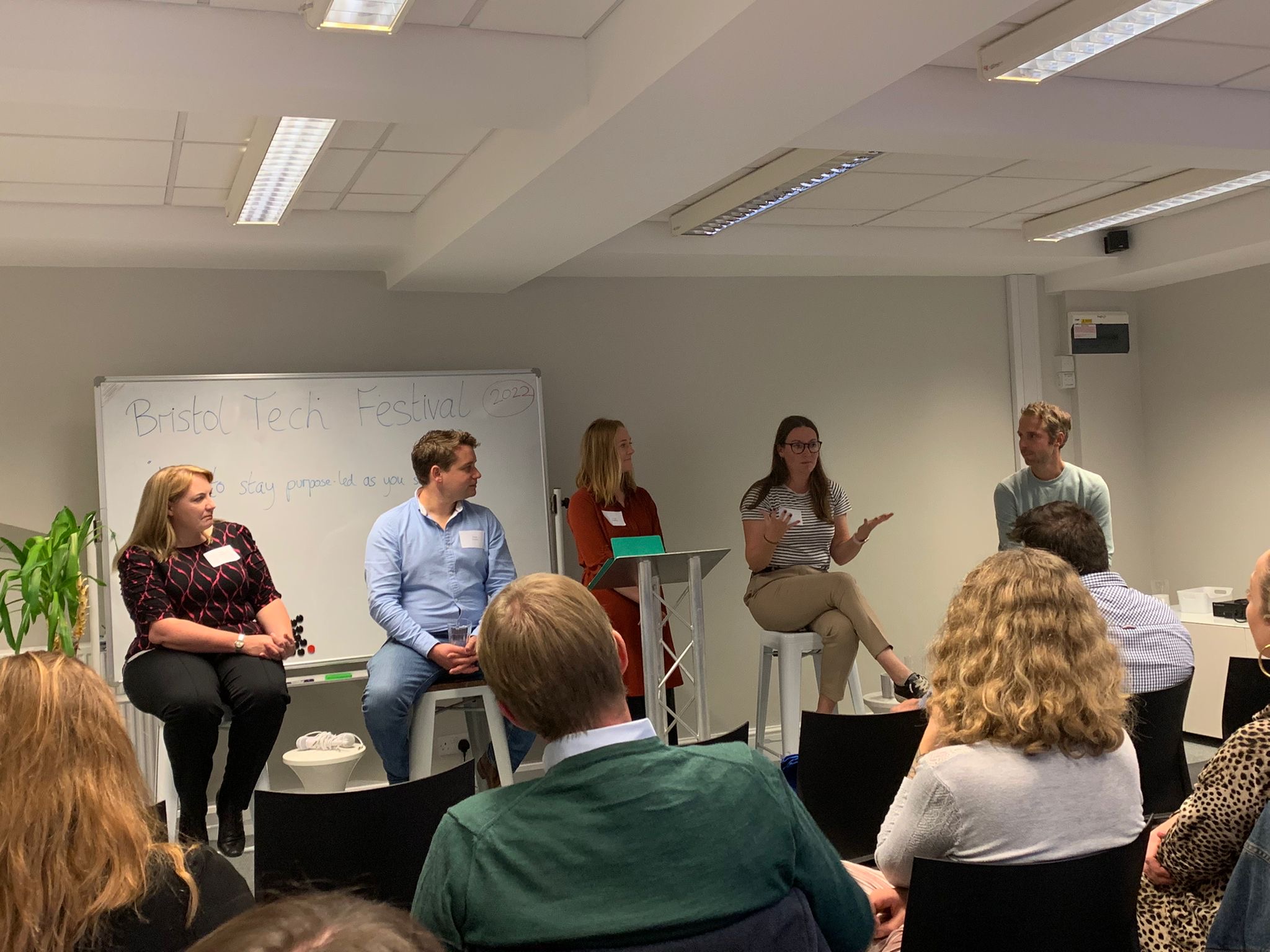“If you want to scale, get a purpose.” Watch the full panel discussion here.
How to stay purpose-led as you scale
Tech businesses often fall into the category of start-up or scale-up. The industry is fast-moving, and rapid growth tends to be more achievable than almost any other industry. Because of this, scalability raises huge opportunities – but also challenges.
One of those challenges, is how to keep sight of your ‘why’. If you are in a scaling company or a startup and interested in how to scale effectively, read on for our takeouts from the recent panel discussion: how to stay purpose-led as you scale.
Why are tech companies talking about purpose?
The number of organisations promoting or adopting a purpose has grown exponentially in recent years. From an inherent desire to support a certain cause, to the opportunity to attract talent, there are a host of reasons why this is happening. Yet, with the rise of greenwashing, it is important for organisations to act with integrity and communicate authentically. We asked our panel to explain their starting point when it comes to understanding purpose:
Matt Hinchcliffe, Head of Client Success at Neighbourly.
“It’s about understanding your role in the world, why you exist, and importantly why that matters: what the world needs and what positive impact you can make.”
Laura Millar, Senior Sustainability Strategist at Six.
“Business has changed from being stakeholder-led; there’s now a responsibility for businesses to make money but do the right thing at the same time. Humans have the skills to solve the problems, we just need to articulate how.”
Peter Hucker, CEO of Xledger UK.
“Helping employees to row the boat in the same direction. It can be easy as a team of five, much harder as team of fifty.”
Jacinta Magee, Portfolio CFO.
“An underlining purpose helps you focus and minimise waste of resources.”
At what stage of growth is this important?
The beginning: Neighbourly exists to connect charities to organisations. Naturally in this case, from the start they had a clear purpose. “When we [Matt] started, we were vocal about who we were, and that helped us grow. Purpose can be a tool that helps build your growth; by being really clear, you attract likeminded people, getting the right talent and clients. It enabled our clients to know what they were buying into.”
Mid-growth: But, what happens if you didn’t set out with this in mind? At Six, Laura works with clients to help define and implement business-wide strategies which have sustainability and purpose throughout. “Even if you’re an established business and not purpose-led now, you have permission to be, because businesses adapt and change all the time. We often see a CSR, Net Zero or environmental strategy, but it’s disconnected from other parts of the business. Brand, product design, HR are all separate. And that’s where greenwashing happens. We like to articulate that strategy as a purpose, giving guiding principles. So anyone in the organisation can check back to that guiding star.”
Summary: whether you’re starting up or starting out, clarity of thought and cross-company collaboration is key when it comes to describing and sharing what your purpose is.
Staying authentic as you scale
What are the important tangible steps you can take to ensure your purpose scales with authenticity? Our panel’s answers centered around these three themes:
Theme 1 | Communication
- Share responsibility and accountability across departments: Before the pandemic, Neighbourly had under 30 employees. Now, there are over 100. “We’ve shared the responsibility so it’s not just senior leaders making decisions. This empowers people across the organisation to make a difference. We’re not scaling a business, we’re scaling a purpose.” [Matt]
- Consider structure and setting up working groups: “We created committees, for example an Ethics Committee, to ensure new clients come on for the right reasons. We could make those decisions at a senior level, however we decided it was best to have it across the organisation. This also helps with feedback, ensuing there is a clear loop, so you know if what you’re doing works.” [Matt]
- Choose the right tools: Communicating internally can be half the battle, and is a great way for the whole company to be on board and all working towards the same goal. From an internal hub, to email, or physical noticeboard. Laura added: “Don’t scrimp on engagement and comms platforms. Lots of organisations do great things, yet their employees don’t know about it. Choose the tools that work for your team, bearing in mind if people are in the office, working from home, and what channels they’re likely to use.”
- Honest communication from the start helps you stay accountable: “When you’re vocal about what you do, as you scale, people can hold you to account based on what you said, three, five or ten years ago [Matt].
Theme 2 | Decision making
- Purpose helps make decisions: “Always ask why – so you’re clear. Whether it’s a business decision or a choice on which charity to support. When you have a purpose, it makes it a lot easier.” [Jacinta]
- Clear decision making helps growth. “See it as a tool to help you grow. Everything is in flux all the time when you’re scaling. So, with more people needing to make decisions, it helps them be clear. If you have a way of making principled decisions clearly and coherently, it means the goal posts aren’t changing, even if the context is.” [Matt]
- It is ok to say no. Saying no can be a really tough decision, turning down a sale. But long-term, it’ll work better; clients may act as referrals, employees will stay with you, and customers may be more forgiving if things don’t go right – because they believe in what you do. Also, when it comes to investment, choosing the right ones will allow you to make decisions in line with your purpose, so it pays to choose wisely. [All]
- Guiding star: when purpose is embedded as strategy, it helps act as that guiding star that everyone works towards. “When I started at Xledger UK five years ago, we were set up to genuinely solve customers’ problems. We spent time understanding how we could authentically solve those. We keep that as a key focus of what we do as we scale. When we engage with customers, we have a long engagement process, spending time to understand their needs, go away and come back with a “we can or we can’t”. Sometimes it is a no, and I’d rather be authentic with that no, and the customer finds the right solution to them. Because, a good customer is hopefully a referral for another!” [Peter].
Theme 3 | Having the right people
- Hiring someone is a huge time and money investment. As an accountant, Jacinta wanted to avoid the waste of money that comes with turnover. If, as Laura says, departments are pulling in different directions due to a lack of coherency, there is a huge chance of waste.
- Purpose helps teams feel connected in a hybrid working environment
- People want a reason to get up in the morning. Coming back to the ‘defining what your purpose is’, Laura added how choosing your purpose can be a lot quicker than businesses might think: “a lot of the time it’s investigating what’s there, rather than going out and looking”.
- Pete added, at Xledger UK “we also only hire accountants to work as our consultants and support team, which means they are quite hard to find, but it works and adds real value for our clients.”
How to approach CSR
As you scale, you might be thinking about how you can give back to your community. You may also be being approached from local charities to support projects. With so many opportunities, what’s the best way to approach it and choose the right cause?
1 | Analyse what’s important
Laura began: “there’s a technical answer to this. ‘Materiality analysis’ – looking at factors affecting businesses and customers, and what is important to you and your team. For us at Six, we found that human rights and business ethics came up first. Now, we have a long-term partnership with Sophie Hayes Foundation. This clarity was only possible by doing this analysis.”
This can help avoiding clichés, as Matt added: “it can go badly if businesses don’t think of the mechanics; the selection of opportunities, are these opportunities appropriate? Volunteering has a cliché as a bit of an away day; it’s not about the business, it’s about the organisation and how you can support it. By doing it in the right way, you ensure it’s not just ticking a box; it’s actually helping.”
2 | A considered approach
“I’ve seen it work very well and very badly, in almost the same situation” explained Jacinta. “In one organisation, teams were encouraged to do a charity day. Massive company, very well embedded in the culture and ethos. The whole team would get really into it, and it was often named as a reason people stayed; everyone got stuck in. Also, employees knew they could do something that suited their skills – it was thought through. Another company did nearly the same thing, but was done slap dash. Some years yes; some years no. It was more of a “you’re going to do this Thursday” activity, and was listed on exit interviews as why people left.”
Clare [panel chair, Xledger UK] went onto explain how “our work with the Bristol Bears Community Foundation goes beyond sponsorship, it’s a real partnership. We invite a group of girls who take part in the Bear in Mind scheme (designed to support those from disadvantaged backgrounds) into the Xledger UK office in central Bristol. As an exciting workplace, it’s a place that can inspire them to understand what is really out there. Our team present career talks, which then helps them feel connected, as well as adding real value and inspiration for the girls.”
3 | Approaching from a charity’s perspective?
A question from the audience posed – how does a charity find businesses that are looking for help? A platform like Neighbourly is ideally placed, added Matt, to find organisations that are interested in supporting groups like yours. Laura also added a great easy tip for charities – “be contactable, have a section on the website about partnerships”, so organisations looking for your type of charity can find you and most importantly get in touch.
Takeaways:
- Communicate: it helps you stay authentic and accountable.
- It takes time and consistency, but keep going back to the purpose, and asking why.
- It’s better to say no to an opportunity than to invest in the wrong one; you’ll waste, time, money and potentially lose sight of the purpose – meaning growth will struggle, and greenwashing could occur.
- The tech industry is in a constant state of flux: if you have a strong purpose, it means your guiding star will always remain the same, regardless of the external environment.
“There’s not one big thing which is going to get us out of the climate crisis and social inequality crisis, it’s not one person… it’s going to be a lot of people doing their bit in their way to make the world a better place, and if all of us activate that in our organisations, we’ll have 20 businesses rowing in the right direction. So please, do that!” Laura Millar, Six.
What’s next?
Xledger UK one of the leading finance software solutions, supporting mid-market businesses to thrive, through automation, insight and scalability. If your business is looking to scale, or going through a period of digital transformation, get in touch with us at mail@xledger.co.uk



